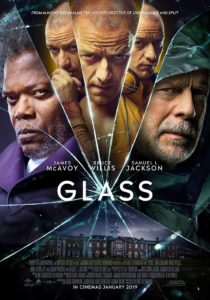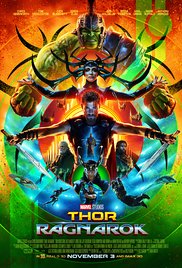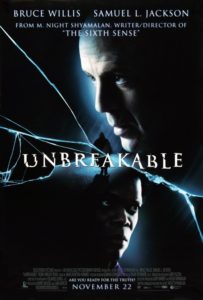Sometimes our writers don’t agree. Most of the time it’s hilarious, all of the time it’s entertaining. And when those disagreements are so intractable, so irreconcilable, we put them in the ring and let them sort it out with verbal fisticuffs in a feature we call Split Decision. Enjoy!
 Josh Crabb: My dearest Blake, how has it come to this? Once the closest of allies after recording a Rewind episode on Pontypool three times and sharing a mutual love of Nic Cage, our alliance has been rent asunder by our polarizing views of M. Night Shyamalan’s latest superhero-adjacent movie, Glass. You were my brother, Blake! I loved you! Now, like the proverbial Lucas-ian high ground, I plan to hold said position and leave your charred, Glass-loving remains to a fate worse than a poorly executed Shyamalan twist. I await your opening remarks.
Josh Crabb: My dearest Blake, how has it come to this? Once the closest of allies after recording a Rewind episode on Pontypool three times and sharing a mutual love of Nic Cage, our alliance has been rent asunder by our polarizing views of M. Night Shyamalan’s latest superhero-adjacent movie, Glass. You were my brother, Blake! I loved you! Now, like the proverbial Lucas-ian high ground, I plan to hold said position and leave your charred, Glass-loving remains to a fate worse than a poorly executed Shyamalan twist. I await your opening remarks.
Blake I. Collier: My dear Joshua, there are greater things in the cosmos than what you have dreamt of in your philosophies. The heavens are opened and the light will shine down upon this divisive trinket that has torn brothers apart, feuding like enemies. Is it nobler of the mind to suffer slings and arrows of your rapier dialectic or bid you adieu with formidable wit, cavalier misapplication of the bard, and the bravery it takes to die upon the hill of this director and his newest film which few seem to defend? I take the latter, dear sir, for I seek to lift up this underdog and preserve its legacy for the betterment of our children’s future. Good luck, dear brother.
Josh: May it be a glistening diadem triumphantly setteth upon thine head to safeguard Mssr. Shyamalan’s…alright, enough of this purple prose. Time to get down to business. The follow-up to 2016’s Split, a movie that was pretty okay and leaned very heavily into James McAvoy’s acting chops, Glass was very underwhelming. Set up as a sequel resolving two disparate movies and ideas, Shyamalan managed to use the once tossed-away idea of McAvoy’s character being introduced in Unbreakable, a movie I enjoy immensely, and work it back into this final(?) installment featuring Elijah Price, David Dunn, and Kevin Wendell Crumb (for the sake of sanity, Crumb will be the go-to name for McAvoy’s multiple personality characters unless otherwise specified).
The first half hour of the movie both won me and lost me. It was very cool to see Dunn working with his now-grown son Joseph as a sort of vigilante hero. However, the conceit on such a movie runs out of steam after the first twenty or so minutes when Dunn is still trying to track down McAvoy’s Crumb. After their capture by Dr. Ellie Staple, the movie almost reboots. It would have made more sense to footnote a lot of this or stretch it out. We’ve established characters, sure, but now we enter my least favorite part, the middle third, which includes an endless amount of exposition and explaining that turned this movie from a movie about superhumans to a movie about explaining character motives. There is so much time spent telling us what characters feel and how it affects everything that by the time it starts to get out of hand, you’ve been number to the madness and laugh with a hollow, joyless mirth reserved typically only for DC Extended Universe movies.
Blake: Let me first say that, I do not think Glass is without its issues and seams. Shyamalan’s dialogue game has never been terribly on point and the later into his career one goes, the more one realizes that his conceptual prowess—because I maintain he has politically and socially interesting concepts in most of his films—far out-strides his ability to execute well his concepts. Unbreakable is in my top all-time films and still my favorite “superhero” film. I actively despised Split when it came out and have had no motivation to revisit it. So I had low expectations with Glass. One might even say I was dreading the experience when I went to see it. I was proven wrong, however.
If I’m reading your point correctly, it seems that one of your biggest gripes with the film was exposition. I can see why that bugged you. It’s a significantly talky film. However, while watching it, I found myself comparing it to films I’d seen last year from the Marvel Cinematic Universe that I would argue are largely style over substance, considering the superhero narrative is nearly impossible to diverge from—hence why they dress films up in genre clothing. While Shyamalan is running the risk of too much exposition, it seems that the pop psychology is the whole point of Dr. Staple’s grand plan…it’s her “superpower” to talk them out of faith in their being superheroes. It had to include the explanations of motivations in order to move the plot along. Just like with Unbreakable, Shyamalan stretches the parts of the hero story that are “understood” in normal superhero films in order to examine their actual nature. He does the same in Glass by slowing it down to see what it takes to destroy the faith at the foundation of a hero’s belief in themselves.
 Josh: Vis-à-vis your assertion of style over substance, I will agree with you many superhero movies have trended towards this, the Avengers movies possibly being the biggest culprits. Yet, there seems to have been an adequate course correction in recent movies that balance dialogue-heavy scripts with pretty colors and explosions. I think we are both on the same page that Thor: Ragnarok does a fabulous job of accomplishing this with the quippy, talk-heavy dialogue of Taika Waititi and a prismatic color palette.
Josh: Vis-à-vis your assertion of style over substance, I will agree with you many superhero movies have trended towards this, the Avengers movies possibly being the biggest culprits. Yet, there seems to have been an adequate course correction in recent movies that balance dialogue-heavy scripts with pretty colors and explosions. I think we are both on the same page that Thor: Ragnarok does a fabulous job of accomplishing this with the quippy, talk-heavy dialogue of Taika Waititi and a prismatic color palette.
However, he does have a style. It’s a sterile laboratory, but this sterile environment allows for his movie to contain too much substance. I reiterate the movie is often weighed down by secondary characters telling us what the main character might be feeling. His response to the more formulaic MCU, X-Men, or DECU narratives isn’t interesting. If anything, it holds our interest in its ability to bore us with some drawn out commentary on superhero movies. Boring is boring. I know you know this. You loved to be entertained! What has become of your once joyous countenance?
And another thing, comparing the faith elements of Unbreakable to Glass is to cast pearls before swine. How dare you, sir, try and equate a movie with nuance and lucid dialogue with prosaic dustbin fodder. I get the faith elements in this film, I really do, but it is ham-fisted in its execution. Plus, anything Dr. Staple says has to be filtered through the lens of her super-secret society “The Clover”. It essentially likens the suppression of faith with an Illuminati-level conspiracy and I found it a bridge too far. In our current political, religious, and social climate, it seemed a little too much like Mr. M. Night buying into some weird admission of anti-faith conspiracy on a global scale. Am I nuts to think such things and/or am I reaching?
Blake: I’m afraid your point has a bit of reach to it, sir. For the faith I was speaking of was less religious and more in a faith in being. Part of being a superhero is believing one truly has the gifts that allow that being to exist. It’s like how I’m sure you and I have both questioned the faith we have in our writing abilities, but we keep writing, we keep believing we are writers. There is a faith inherent in gifting. That’s what I spoke of and that’s how I think Glass responds to the various superhero universes out today: the existential questions of being gifted with powers for good or evil. The existential faith in being who we are.
These questions are never given time in 99% of these films. Sure, we see struggles with loyalty, morality, ethics, etc. but we never see superheroes struggle with their lack, their doubt, etc. Unbreakable dealt with discovery and revelation of that being: a truer origin story. From “unbelief” to “belief.” With Split, no one knows what it’s speaking about because it’s fairly pointless. Glass, however, is struggling with the “what now?” Each character is going through doubt by the hand of the tempter (the doctor and the cult) and coming out the other side more convinced than ever that this is who they are to be, the part they are to play. And then they die. But they die knowing they fit, they belong. That’s powerful and a fitting end to the trilogy.
As for boring, boring is subjective. I was gripped throughout the film. Never looked at my clock.
Check. Mate.
Josh: You might want to CHECK the board, MATE, because this mental chess game is far from over. And as for existential questions of doubt, have you ever seen Sam Raimi’s Spider-Man movies? Raimi’s movies may have lacked the perspicacity and hindsight of Glass, the subtext of doubt and being are woven into the narrative, most prominently in Spider-Man 2, while also containing all the elements of a modern superhero movie. Plus, it was far more exciting and less dour than Glass.
 In fact, those two sets of trilogies, Shyamalan’s Unbreakable/Split/Glass and Spider-Man 1/2/3, have the potential of being mirrors held up to the other. Raimi’s movies went all-in on the fantastical, comic book nature of Spider-Man and fanboys lambasted him for it. The Unbreakable-verse feels like the product of the darker, more somber graphic novels exploring these questions for textual, brainier fans of the aforementioned medium. Both create interesting, meta-textual ideas and are to be admired for them, but both vary wildly in the execution of these ideas and both final installments fail to create a comprehensive story. Spider-Man 3 is a crazy person dancing in public and Glass is a crazy person mumbling nonsense in a dark, padded room. Is it possible we can admire the high concepts in Glass while lamenting some of the lesser filmmaking elements?
In fact, those two sets of trilogies, Shyamalan’s Unbreakable/Split/Glass and Spider-Man 1/2/3, have the potential of being mirrors held up to the other. Raimi’s movies went all-in on the fantastical, comic book nature of Spider-Man and fanboys lambasted him for it. The Unbreakable-verse feels like the product of the darker, more somber graphic novels exploring these questions for textual, brainier fans of the aforementioned medium. Both create interesting, meta-textual ideas and are to be admired for them, but both vary wildly in the execution of these ideas and both final installments fail to create a comprehensive story. Spider-Man 3 is a crazy person dancing in public and Glass is a crazy person mumbling nonsense in a dark, padded room. Is it possible we can admire the high concepts in Glass while lamenting some of the lesser filmmaking elements?
Blake: Oh, for sure, my dear friend. I’d like to point to my opening argument where I stated that Glass is far from perfect. Matter of fact, I still maintain that if Shyamalan had been given the green light to make the full trilogy, as he intended at the time, I think they would have been much better realized…unfortunately, those who didn’t like the pacing, brainier, existential version of the superhero film made sure to either not go see Unbreakable or give it largely negative appraisal. These are the same people I’d take a wild guess are the ones who continue to prop up the MCU and, I suppose, the DCEU as the “true” form of the superhero. This is what they want. Nolan and Raimi were working with a largely clean slate. Shyamalan with a cleaner slate.
There is no doubt that Shyamalan’s trilogy would have looked differently if done in immediate succession. Yet he was finally given the okay to finish them after 10 years of superhero films when people were either burnt out or wanting the same thing Marvel and DC have been churning out this whole time. In other words, I think Shyamalan drew the short straw and, yet, to do what he did with this story in the wake of where we are cinematically with these narratives, I have to give him credit for going more cerebral and “dour” if you’d like to call it that. It still had a lightness and humor which DC largely doesn’t  have and it struggled with being more than Marvel cares to. For me, I’ll take the crazy mumbling and dancing men over what has become blandness with a new outfit every film. Gives me more to think on and more to remember than a majority of superhero films coming out these days. However, I am also okay being in the minority on Glass. It’s not bad over here. Plus, we have cookies.
have and it struggled with being more than Marvel cares to. For me, I’ll take the crazy mumbling and dancing men over what has become blandness with a new outfit every film. Gives me more to think on and more to remember than a majority of superhero films coming out these days. However, I am also okay being in the minority on Glass. It’s not bad over here. Plus, we have cookies.
Josh: To a certain extent, we are of the same mind. I do not feel like Glass delivered and I refuse to give it the benefit of the doubt or come over to your side just for the cookies. Marvel and DC movies can be hit or miss. Perhaps recent successes—minus Infinity War, which we both weren’t super into—have glazed over my opinion of the whole MCU filmography. And perhaps we aren’t so far away as our strong opinions suggest. Shall we declare an armistice or write another thousand words?
•
Come over to the Reel World Theology discussion group on Facebook to continue the debate!


